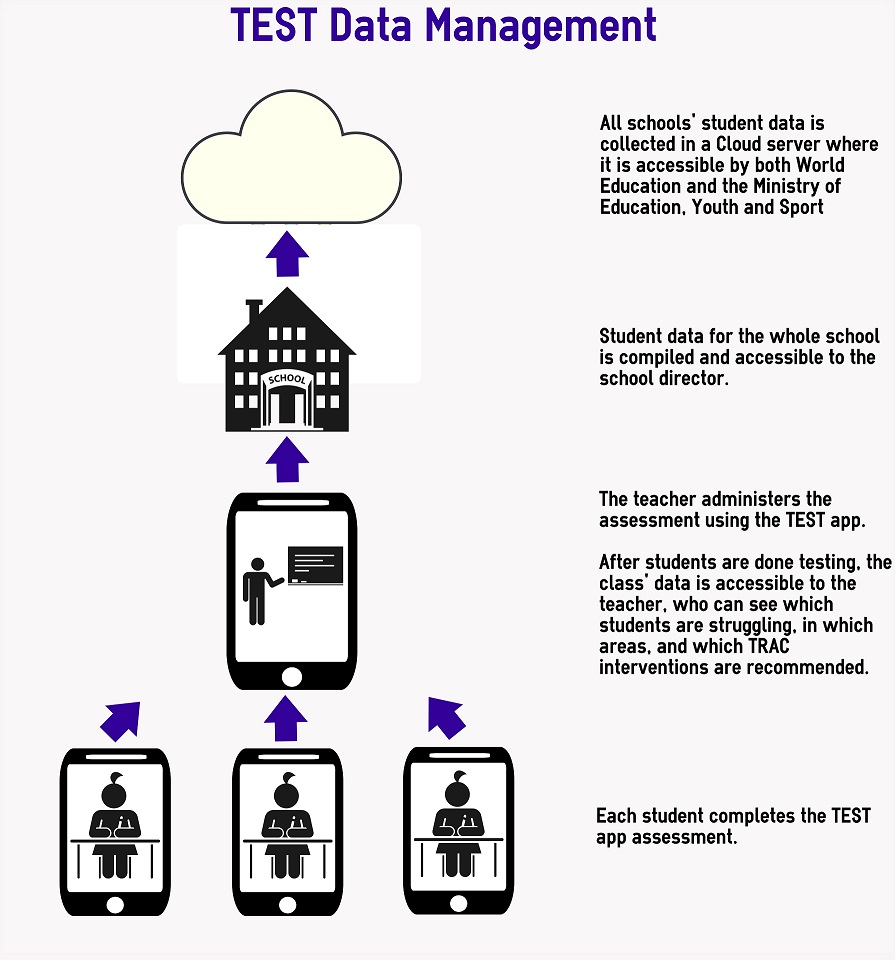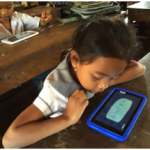
In the Technology for Education Systems Transformation (TEST) project, World Education developed, tested, and implemented a digitized and automated early-grade reading formative assessment. The application, known as the TEST app, improves upon the previous pencil-and-paper version of the formative assessment by increasing uniformity in test administration, reducing scoring error and bias, and automatically compiling student score data to quickly identify struggling students. These improvements also promote teacher understanding and use of a continuous assessment system (CAS) as a diagnostic tool for student learning, while at the same time facilitating teacher and student use and understanding of technology in the classroom. The formative assessment used on the TEST app were developed by the Total Reading Approach for Children (TRAC) project and formally endorsed by the Ministry of Education, Youth and Sport (MoEYS) as National Reading Standards (widely referred to as reading benchmarks).

Under the Technology for Education Systems Transformation Expansion (TESTx) project, World Education is enhancing the TEST app and transitioning it fully to the MoEYS for nationwide scale-up. The goal of the TESTx project is to build the capacity of the MoEYS to manage, use, and adopt the TEST app to administer the national grades 1-3 formative assessment system. As the assessment data is collected directly from the app and stored in a database, the app has the potential to provide the MoEYS with a wealth of data on early grade reading trends across the country. Overall, the TEST app and reading benchmarks are enhancing the ability of children to acquire essential literacy skills. Teachers across Cambodia are using the reading benchmarks to identify struggling students, provide timely, targeted support and improve early grade learning outcomes. The TEST and TESTx project are supported by DAI through their Development Innovations Project, funded by USAID.
Watch a video about one young reader’s experience with the TEST app here.

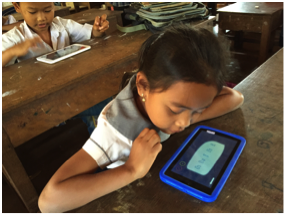 In the Technology for Education Systems Transformation project (TEST) project, World Education developed, tested, and implemented a digitized and automated early-grade reading assessment. The benchmarks and assessments used for the TEST app were developed by the Total Reading Approach for Children (TRAC) project, and were formally endorsed by the Ministry of Education, Youth and Sport (MoEYS) at the conclusion of TRAC. The TEST project worked with over 2,000 students and 57 teachers to develop the app and optimize its usability; at the conclusion of the TEST project, the app was ready for scaling up in an additional hundred schools.
In the Technology for Education Systems Transformation project (TEST) project, World Education developed, tested, and implemented a digitized and automated early-grade reading assessment. The benchmarks and assessments used for the TEST app were developed by the Total Reading Approach for Children (TRAC) project, and were formally endorsed by the Ministry of Education, Youth and Sport (MoEYS) at the conclusion of TRAC. The TEST project worked with over 2,000 students and 57 teachers to develop the app and optimize its usability; at the conclusion of the TEST project, the app was ready for scaling up in an additional hundred schools.
The TEST app improves upon the previous pencil-and-paper version of the TRAC assessments by increasing uniformity in test administration, reducing scoring error and bias, and automatically compiling student score data to quickly identify struggling students. These improvements also promote teacher understanding and use of the Continuous Assessment System (CAS) as a diagnostic tool for student learning, while at the same time facilitating teacher and student use and understanding of technology in the classroom. TEST was supported by DAI through their Development Innovations Project, which is funded by USAID.
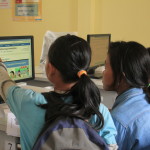
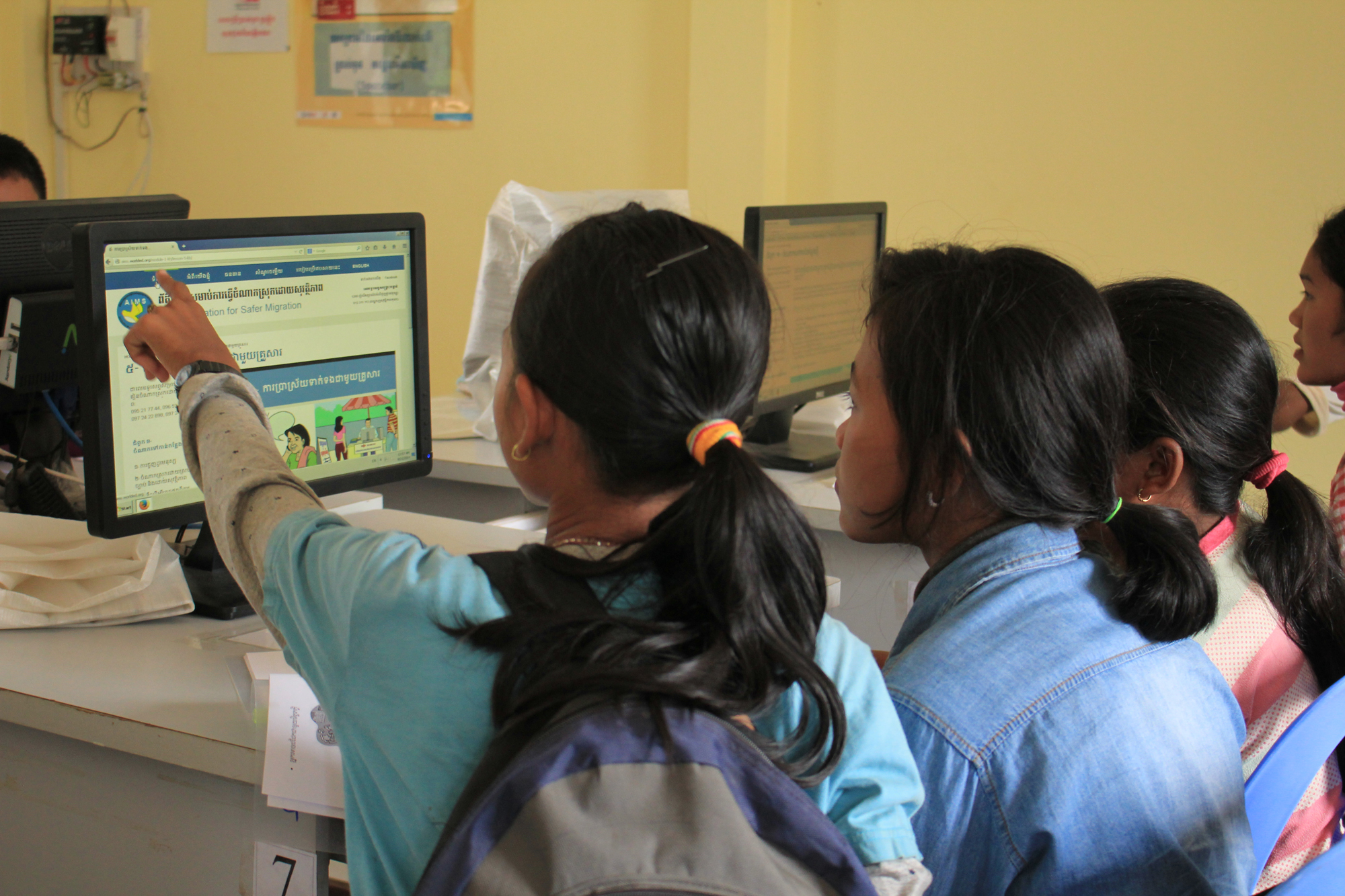 In Cambodia, rates of youth migration are high, as youth leave their families and home communities in search of job opportunities. Current data shows that less than 35% of adolescents are enrolled in lower secondary school, and that many are leaving school to migrate through illegal, irregular, and highly risky channels, leaving them without the protection and information that regulated migration can provide.
In Cambodia, rates of youth migration are high, as youth leave their families and home communities in search of job opportunities. Current data shows that less than 35% of adolescents are enrolled in lower secondary school, and that many are leaving school to migrate through illegal, irregular, and highly risky channels, leaving them without the protection and information that regulated migration can provide.
In 2013, with funding support from the Dream Blue Foundation, World Education began the development of Cambodia’s first ever Khmer-language website and accompanying Interactive Voice Response (IVR) system, aimed at providing migrant or potential migrant youth with information to help them stay safe. The website – aims.worlded.org – developed through the project has learning modules that cover illegal migration, recruitment companies, work contracts and wages, how to avoid being trafficked or cheated, and tips on maintaining a healthy lifestyle while away from home. For those with limited computer access and skills, or limited written Khmer literacy, lessons have audio options and the website is coupled with an Interactive Voice Response (IVR) system which provides the same information over the phone. Trainings on the use of the website and IVR system were conducted by peer educators in schools, communities, and factories, and included lessons on how to use information and communications technology safely.
Given the success of the AIMS pilot, and the persistent rise in youth unsafe migration rates, World Education is seeking continued support for a roll-out of Internet and AIMS website training to a great number of lower secondary schools, youth and migrant networks, and factories. In addition, World Education hopes to develop a Safe Migration life-skills training package based on the website, to consolidate safer migration learning and behavior change among youth in Cambodia.
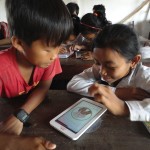
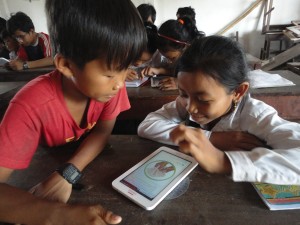 Youth on the Move (YOTM) is World Education’s regional initiative aiming to reduce the vulnerability of potential migrant, and migrant, youth to trafficking, exploitation and abuse through improved learning outcomes, life skills, and knowledge about safe migration.
Youth on the Move (YOTM) is World Education’s regional initiative aiming to reduce the vulnerability of potential migrant, and migrant, youth to trafficking, exploitation and abuse through improved learning outcomes, life skills, and knowledge about safe migration.
Faced with poor education outcomes, stagnant rural economies and limited income generation opportunities, many Cambodian youth leave their villages in search of work within Cambodia and further afield, most often using illegal, irregular and highly risky migration channels. Without the education levels, skills, knowledge, behaviors, and support networks that are necessary to help them stay safe and attain gainful employment, these youth are extremely vulnerable to forced labor, abuse and exploitation, including labor and sex trafficking.
Youth on the Move Cambodia currently focuses on Prey Veng province which is a major source area for trafficking and child labor; suffers from severe food insecurity; and has among the lowest education achievement rates and highest migration rates of the entire country. Working alongside local education officials and working groups, Youth on the Move Cambodia partners with upper primary and lower secondary schools in migration-prone areas to reach vulnerable youth before they drop out and migrate, and utilizes peer educators and technology to reach out-of-school and migrant youth. Interventions include scholarships to address cost barriers preventing vulnerable youth staying in school; remediation for those at risk of academic failure; life skills education on topics known to be essential for keeping migrant youth safe; and, the roll out of World Education Cambodia’s recently developed Khmer-language safe migration website targeted at youth, with accompanying training curriculum.
YOTM has recently shifted to revitalizing Student Councils in secondary schools as a major vehicle to foster youth participation and address the low perceived relevance and quality of education that is known to contribute to persistently high school drop out rates in Cambodia. Under YOTM, Student Councils organize a range of enriched learning activities and youth voice opportunities, and provide peer-education in Information Communication Technology (ICT) skills, safe migration, financial literacy, and entrepreneurship.
Youth Development Work Photo Story
“Not even the Pouring Rain Could Dampen their Spirits” – Youth on the Move Feature Story
Youth on the Move Baseline Survey Report
Harnessing Technology for Youth Learning and Safety
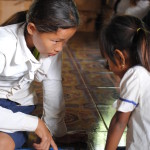
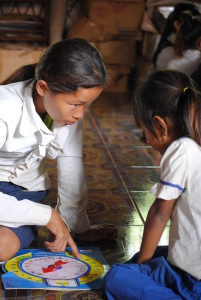 In 2012, World Education, Inc. (WEI) was awarded a grant to implement the innovative Total Reading Approach for Children (TRAC) project (October 2012-September 2014) under the All Children Reading Grand Challenge, a consortium of donors including USAID, World Vision, and Australian Aid. The backdrop for TRAC came as a result of a World Bank assessment in 2010 that found disappointing reading achievement scores on a national test administered in Khmer Language: According to the test results, as many as 54% of tested children were not able to demonstrate expected reading skills at the Grade 1 level. Based on these findings, Cambodia’s Ministry of Education, Youth, and Sport (MoEYS) developed new readers for grades 1-3. The newness of these textbooks provided a prime opportunity for WEI to work with the MoEYS to support the implementation of the new curricula.
In 2012, World Education, Inc. (WEI) was awarded a grant to implement the innovative Total Reading Approach for Children (TRAC) project (October 2012-September 2014) under the All Children Reading Grand Challenge, a consortium of donors including USAID, World Vision, and Australian Aid. The backdrop for TRAC came as a result of a World Bank assessment in 2010 that found disappointing reading achievement scores on a national test administered in Khmer Language: According to the test results, as many as 54% of tested children were not able to demonstrate expected reading skills at the Grade 1 level. Based on these findings, Cambodia’s Ministry of Education, Youth, and Sport (MoEYS) developed new readers for grades 1-3. The newness of these textbooks provided a prime opportunity for WEI to work with the MoEYS to support the implementation of the new curricula.
Watch a short video about the TRAC Project
Under the TRAC project, WEI worked closely with the MoEYS to improve reading outcomes of Grade 1 and 2 students in Cambodia using an integrated approach that includes various innovative interventions:
- Reading Benchmarks: WEI collaborated with the MoEYS to create a reading benchmark system for the new national reading curriculum. The first time such benchmarks have been created in Cambodia, they include specific tasks and skills that students should master at designated intervals. The benchmarks include regular interval assessments, which allow teachers to identify struggling students and provide timely, targeted support. These benchmarks have been now been fully endorsed by the MoEYS
- Literacy Coaches: TRAC selected and trained school-based literacy coaches, the first time such a position has been created in Cambodian schools. These coaches help teachers administer the benchmark assessments and the Rapid Response System interventions. They also act as the liaison between schools and parents.
- Rapid Response System: Literacy coaches implement the project’s Rapid Response System (RRS) after identifying struggling students through the benchmark assessments. The RRS includes parental engagement, peer tutoring, a reading toolkit, and an mLearning application. The toolkit and mLearning application are aligned with the national curriculum and TRAC reading benchmark system. The mLearning application is the first Khmer language education app for primary grades.
TRAC Project Outcomes
After successfully achieving over 90% of the project’s performance indicators during the course of the project, it is safe to conclude that the TRAC project was highly successful. The project developed a holistic approach with a diversified set of activities that involved various stakeholders, including parents, teachers, school directors, literacy coaches, and community members. TRAC was able to empirically demonstrate statistically significant changes in students’ reading scores from baseline values both within treatment schools and in comparison to control schools. Furthermore, the project developed significant products that will greatly enhance educational quality in Cambodian schools: These include the development of the reading benchmark system for Grades 1 and 2, protocols for a Rapid Response System to promote continuous assessment linked to remedial responses, an mLearning literacy app linked to the national curriculum, and a Reading Toolkit. The MoEYS has approved and adopted the model, charting a clear path for replicating the TRAC model in additional schools.
Key results from the project are highlighted below:
- 87 teachers completed in-service training and/or received intensive coaching with USG support.
- 94% of TRAC teachers utilized the project’s Rapid Response System to provided targeted reading interventions to struggling students.
- 100% of TRAC Literacy Coaches correctly used activity protocols according to Rapid Response System implementation criteria.
- 3% of parents reported improved parental engagement in their children’s education due to TRAC.
- 160 mobile devices (and accompanying furniture and safes for storage) were provided to eight TRAC target schools to incorporate technology into the learning process.
- TRAC provided 1,908 textbooks and learning materials to eight target schools.
- There were statistically significant improvements in reading scores from baseline values both within treatment schools and in comparison to a number of control schools.
- The Ministry of Education, Youth, and Sport provided government approval and adoption of the reading benchmark and assessment system developed under TRAC.
Expanding TRAC
Due to the successful completion of the TRAC pilot project, WEI is further expanding TRAC interventions through two current projects:
- Technology for Education Systems Transformation (TEST): Using the tablets provided to schools under the TRAC project, the TEST project has worked closely with a local app developer to digitize and automate TRAC’s benchmark assessment system. Rather than taking the benchmarks assessments on paper, students will take the assessments on an app. The app automatically scores the assessments, identifies students who are struggling, and suggests interventions from the Rapid Response System for the struggling students. Teachers, literacy coaches, and librarians can then administer the Rapid Response System interventions. The app will help improve consistency in administration and validity of test data. TEST is currently piloting the app in 10 schools and expects to roll out the app to additional schools following the pilot and final software adjustments. TEST is funded by USAID’s Development Innovations Project.
- Total Reading Approach for Children Plus (TRAC+): Funded by World Vision, TRAC+ is expanding the core TRAC interventions from the eight pilot schools to 170 schools in Beantey Meanchey, Kampong Thom, Preah Vihear, Siem Reap, and Takeo provinces. In addition to the core TRAC interventions, under TRAC+ WEI will also develop reading benchmarks for Grade 3, pilot reading interventions for Grade 4-6 students, and provide capacity building support to World Vision staff.
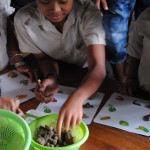
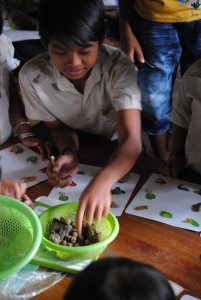 The Improved Basic Education in Cambodia project (IBEC) was a major education development project supported by USAID during the period of 2009-2014, with a budget of $10 million. The project was implemented by World Education as the prime contractor and included strong cooperation with civil society partners and government. The project lasted five years and had an IBEC was characterized by an integrated design that provided support to over 300 schools in Kampong Cham, Siem Reap, and Kratie provices.
The Improved Basic Education in Cambodia project (IBEC) was a major education development project supported by USAID during the period of 2009-2014, with a budget of $10 million. The project was implemented by World Education as the prime contractor and included strong cooperation with civil society partners and government. The project lasted five years and had an IBEC was characterized by an integrated design that provided support to over 300 schools in Kampong Cham, Siem Reap, and Kratie provices.
IBEC led to improvements in educational access, quality, and relevance, along four components:
- Local NGO/Government Capacity Building and Advocacy for Sustainability;
- More Equitable School Access (Subcomponents included Scholarships and School Grants);
- Improved School Management and Community Engagement; and
- Educational Relevance (Subcomponents included Workforce Development through Life Skills Education, Educational Innovation for Science & Technology, and Teacher Education).
Key results of IBEC are summarized below:
- Provided enhanced educational services to 136,383 students (49.5% female) of which 81,024 were primary school students and 55,359 were secondary school students.
- Constructed 32 classrooms and repaired 716 classrooms.
- Provided 141,043 people with access to improved drinking water supplies and sanitation facilities in 300 schools.
- Trained 553 school administrators/officials.
- Trained 1,904 (829 female) secondary school teachers.
- Supported 292 Parent Teacher Associations and similar governance structures.
- Improved management information systems in 292 institutions
- Printed and distributed 232,860 textbooks and other teaching and learning materials.
- Provided scholarships to 7,438 (4,246 female) primary school children and 2,241 (1,586 female) secondary school children. 94% of primary and 83% of secondary school scholarship beneficiaries stayed in school through the end of IBEC.
- Provided 360 individuals from remote and high priority areas with scholarships to Provincial Teacher Training Colleges.
- 848 families in target schools adopted practical livelihoods activities as a result of school-community outreach.
- 26 IT labs and 24 science labs were constructed by IBEC.
- 100% of sampled schools registered enhanced reading environments through one or more of the following channels: a) storybook hour in libraries, b) reading corners in classrooms, c) use of special readers and other materials, and d) administration of formative reading tests.
- 72% of these schools achieved a minimum standard of reading on a competency test, and 87% of children with reading problems who received remedial instruction in Year 4 of IBEC were promoted.
Creating Leaders with Vision – IBEC Success Story
Star Scholar Urges Classmates to Stay in School – IBEC Success Story
Chronic poverty, landlessness, depletion of resources, lack of year-round employment, debt, and national disasters prompt many young Cambodians living in rural areas to migrate to Phnom Penh each year. Many of these youth – particularly young women – become garment workers. These women are often single and illiterate or with low levels of education, and they lack the knowledge and socio-economic skills that allow them to have successful work and life outcomes in their new environments. In response to these critical issues and needs of vulnerable women, the International Labour Organization (ILO) commissioned World Education to develop a Life Skills Training Program for Garment Workers.
Building on a past partnership between ILO and World Education on the ILO-funded Pre-Industry Life Skills program, World Education utilized materials already developed by both organizations and combined them to create a training curriculum focused on five core elements – safe migration, financial literacy, nutrition and health, personal hygiene, and prenatal care – to increase the work-life skills, health and well-being of garment workers. World Education developed a Training of Trainers manual for the curriculum and trained eight members of a local NGO, Cambodian Women for Peace and Development, who were then able to conduct interactive trainings to 20 different groups of factory workers in four different garment factories. In total, 502 garment workers participated in the training over the course of the project.
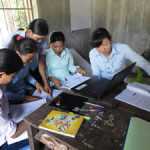
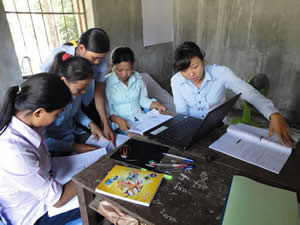 More than 50% of Cambodia’s population is under the age of 18, and only about one-third of which completes Grade 9. As a consequence, many youth do not develop the skills, behaviors, and support networks that are necessary to attain gainful employment and keep them safe from exploitation. The most disadvantaged youth – especially girls – are at particular risk for facing unemployment, sexual and labor exploitation, trafficking, poor health, drug abuse, violence, crime, sexually transmitted infections (STI) and HIV infection.
More than 50% of Cambodia’s population is under the age of 18, and only about one-third of which completes Grade 9. As a consequence, many youth do not develop the skills, behaviors, and support networks that are necessary to attain gainful employment and keep them safe from exploitation. The most disadvantaged youth – especially girls – are at particular risk for facing unemployment, sexual and labor exploitation, trafficking, poor health, drug abuse, violence, crime, sexually transmitted infections (STI) and HIV infection.
ConnectEd aimed to minimize these risks through improved learning outcomes, preparedness for the world of work, and civic engagement of disadvantaged youth. These goals were achieved through a range a interventions that included life skills and personal development courses, skills training, and ‘Youth Voice’ actions and campaigns. The project focused particular attention on promoting digital inclusion–integrating technology into the classroom and ensuring access to information, education, and communication–improving school access and completion rates for in-school youth, providing nonformal education learning opportunities to out-of-school girls and disadvantaged youth, improving access to formal schooling for previously out-of-school girls and youth, and enhancing workplace preparedness.
Funded by the Alcatel-Lucent Foundation, ConnectEd is a global initiative that spans across seven countries: Australia, Brazil, Cambodia, China, Egypt, France, and India. In Cambodia, the project worked predominantly in Prey Veng province, which has the highest poverty levels in the country and low education participation rates. Additionally, it is a major area for trafficking, sexual exploitation, and child labor; suffers from severe food insecurity; and has a large migrant population due to under-employment. In Phnom Penh, WEI partnered with Happy School to implement a small component of the project with migrant youth who are outside of the formal school system and who suffer discrimination, poor housing, extreme poverty, an unstable family life, and exclusion from social services.
Alcatel-Lucent employees in Cambodia were actively involved throughout the ConnectEd program. They played a key role in the program’s success through fulfilling such roles as mentoring, tutoring, facilitating student clubs, assisting in setting up computer labs, and guest speaking at events.
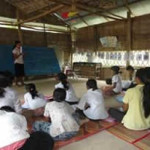
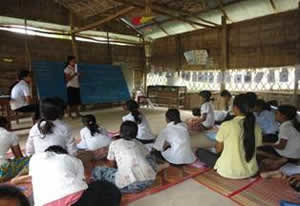 The Pre-Industry Life Skill (PILS) Program was designed to provide opportunities for vulnerable young women aged 15-24, who have expressed the intention to leave their home villages in search of economic opportunities, particularly in garment factories in urban areas. Supported by the International Labour Organization (ILO), the PILS program addressed the need for these women to have the skills necessary for job readiness and to be exposed to social and health messages delivered through a capacity building program, and the development of a peer system among young women leaders in the target communities.
The Pre-Industry Life Skill (PILS) Program was designed to provide opportunities for vulnerable young women aged 15-24, who have expressed the intention to leave their home villages in search of economic opportunities, particularly in garment factories in urban areas. Supported by the International Labour Organization (ILO), the PILS program addressed the need for these women to have the skills necessary for job readiness and to be exposed to social and health messages delivered through a capacity building program, and the development of a peer system among young women leaders in the target communities.
The PILS Program was implemented in Prey Veng Province, where there are chronic socio-economic problems, particularly food insecurity, owing to annual cycles of drought and flooding; thus, young girls and women migrate regularly to other areas of Cambodia in search of better livelihood opportunities. This migration is most often “blind” in that people migrate without a pre-arranged employment opportunity. Girls and young women among these migrants are most vulnerable — obliged to earn an income, but uneducated and inexperienced, they are the easiest prey for those involved in exploitative labor industries.
The goal of the PILS program was for vulnerable young women who are potential economic migrants to have the skills and knowledge to engage in migration that results in safer and improved work and life outcomes. This was achieved by providing participatory Training of Trainer (TOT) workshops and ongoing technical and monitoring support to selected community women leaders on pre-industry life skills topics and facilitation skills. These women leaders in-turn facilitated a 10-week course to young women in their communities who planned to migrate for work mainly for garment factory employment.
Through the development of a pre-industry life skills curriculum, PILS also seeked to provide a replicable model and materials for pre-industry life skills programs in other communities beyond this project. Through this program, World Education worked closely with Community Support Groups (CSG) made up of Commune Councils officials, mainly from the Commune Focal Points for Women and Children (CCWC) in the target communes. Their engagement encompassed attending trainings, data collection, target group identification and selection, and project monitoring support. The CSGs played a key liaison role between the beneficiaries and PILS project staff.
Systems that enable governments and organizations to monitor and evaluate ongoing activities are critical to ensuring program effectiveness and quality. With support from UNICEF, World Education, in partnership with John Snow, Inc. (JSI), developed a monitoring and evaluation (M&E) system to monitor, analyze, and report on the basic essential services delivered to orphans and children affected by HIV and AIDS and other vulnerable children (OVCs) in Cambodia under the National Plan of Action for Orphans, Children Affected by HIV and Other Vulnerable Children in Cambodia, 2008–2010.
This activity was designed in response to a recent review from the OVC Taskforce in Cambodia of the documented challenges in the implementation of the national plan (NPA). The WEI/JSI consultancy team:
- Identified data/reporting needs as per the essential services delivered to OVC under the NPA;
- Developed a M&E framework and harmonized system for monitoring services being delivered to OVC;
- Ensured that the system was pilot tested for routine data collection, reporting, and management in at least one province; and
- Outlined and delivered minimum training and capacity building needs for coordinating and implementing partners.

